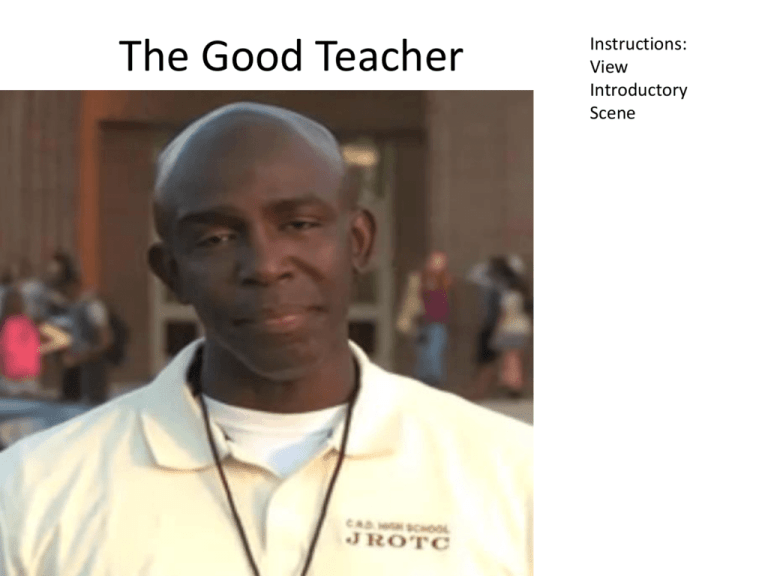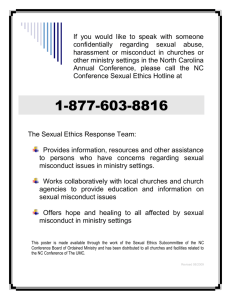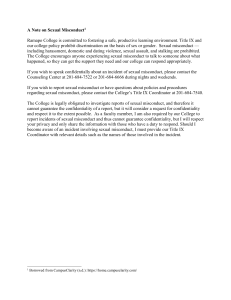
The Good Teacher
Instructions:
View
Introductory
Scene
Instructions:
Choose “An
Introduction by Dr.
Troy Hutchings
Tutorial:
Teachers usually pursue their careers
because they have the opportunity to
impact student growth on so many levels.
They receive very little training in their
teacher preparatory programs or on the
job about proper relationships with
students. This lack of training is
unfortunate because the teacher/student
relationship is a continual emotional and
intellectual interchange. From the
beginning few teachers are prepared for
the immersion into the complex world of
teacher/student relationships. At a
minimum a solid professional, ethical
framework is necessary to guide teachers’
words, acts, and decisions.
Instructions: After
viewing the
Introduction by Dr.
Troy Hutchings review
the tutorial
Questions from the Introduction:
1. Why do teachers generally pursue their careers?
a.
b.
c.
d.
they like summers off
they enjoy students’ enthusiasm from their lectures
the opportunity to impact student growth on many levels
the salary
2. To avoid very troubling scenarios a solid professional, ethical
framework is necessary to guide teachers’
a.
b.
c.
d.
words, finances, and decisions
words, acts, and decisions
words, finances, and acts
all of the above
Instructions:
Answer the
questions
Questions from the Introduction (cont):
3. In reality few teachers are prepared for the immersion in the
complex world of teacher/student relationships.
a.
b.
true
false
3. The teacher/student relationship is
a.
b.
c.
d.
should always be formal
is never emotional
a continual emotional and intellectual interchange
needs to be completely sterile
Presentation by Dr. Troy Hutchings
Instructions: Click
Next to continue
the the
Presentation by Dr.
Troy Hutchings
Tutorial:
Instructions: Review
Amazingly, teacher misconduct with students is a subject the tutorial
not discussed and as stated previously, rarely included in
teacher preparatory programs. As a result, we have an
entire workforce interacting with children that does not
understand boundaries. In many cases of sexual
misconduct there is myriad of decisions made that go
from verbal and written communication all the way to
physical contact. Thus, the title of this program could be
anything from “The Slippery Slope” to “Are you Ready for
Some Controversy” to “Duh, Shouldn’t Teachers Just
Know?” Most people believe that the top priority for
schools and their teachers is to educate children. It is,
however, the safety and welfare of the children. They are
the largest population of people who are “held captive”
and the responsibility for their safety is huge. Teachers
and administrators are fiduciaries who are entrusted to
take care of the children. Statistics indicate we are not
doing such a good job of this though because according to
Shakeshaft 9.6% of all students in grades 8 – 11 report
contact and/or non contact educator sexual misconduct
that was unwanted
Tutorial:
Five groups of people are fiduciaries - teachers, attorneys,
doctors, counselors/therapists, and the clergy. Of the five only
one group does not receive formal ethics training – teachers. All
the others receive that training starting in pre-service and
throughout their careers. Yet teachers are the only group that
works primarily with a captive audience.
Most people think that those who become involved in sexual
misconduct are monsters, but in reality they are often very good
teachers.
Questions from the Presentation:
1. Teacher misconduct with students is a subject
a.
b.
c.
d.
not discussed and rarely included in teacher prep programs
with no solutions so rarely included in teacher prep programs
always about predators so rarely included in teacher prep programs
all the above
2. We have an entire workforce interacting with children that
does not understand
a.
b.
c.
d.
boundaries
time limits
financial implications
all of the above
Instructions:
Answer the
questions
Questions from the Presentation (cont):
3. In many cases of sexual misconduct there is myriad of
decisions made that go from verbal and written
communication all the way to physical contact
a.
b.
true
false
3. The topic of teacher misconduct could be called:
a.
b.
c.
d.
a slippery slope
are you ready for some controversy?
duh, shouldn’t teachers just know?
all of the above
Questions from the Presentation (cont):
5. According to case law, what is the top priority for all schools
and their teachers?
a.
b.
c.
d.
6.
education of the children who are the future of the country
safety and welfare for the children who are held captive
none of the above
all of the above
Fiduciary refers to a power imbalance where a group is
trusted to take care of another
a.
b.
true
false
Questions from the Presentation (cont):
9. According to Shakeshaft ___% of all students in grades 8 – 11
report contact and/or non contact educator sexual
misconduct that was unwanted
a.
b.
c.
d.
6.
11
1.2
3
9.6
Fiduciary refers to a power imbalance where a group is
trusted to take care of another
a.
b.
true
false
Questions from the Presentation (cont):
11. Of the five groups of people who are fiduciaries - teachers,
attorneys, doctors, counselors/therapists, and the clergy, the
only group that does not receive formal ethics training starting
at pre-service and throughout their careers is:
a.
b.
c.
d.
attorneys
teachers
doctors
counselors
12. Most people think that those who become involved in
sexual misconduct are monsters, but in reality they are often
a.
b.
c.
d.
just kidding
poor teachers
very good teachers
none of the above
William Fibkins
“The boundary between helping
and becoming a friend,
confidant, surrogate parent,
even a lover is hard to see when
the teacher becomes overly
involved with her students.”
“Sexual issues and needs
dominate teenage life as do the
needs to belong, to be accepted,
to be cared for, and to be loved.”
“When teenage students find a caring teacher they transfer
those feelings to that person. Teachers have similar needs for
friendship, to be cared for, to be accepted, and being human
teachers can and will develop a problematic personal
relationships at various stages during their careers and seek
out comfort, caring, and support. Many teachers will
experience issues related to divorce, death, and so on”…. we
call that the famine of the soul.”
Tutorial:
William Fibkins Innocence Denied (cont).
“The boundary between helping and becoming a friend,
confidant, surrogate parent, even a lover is hard to see when the
teacher becomes overly involved with her students.”
“Sexual issues and needs dominate teenage life as do the needs
to belong, to be accepted, to be cared for, and to be loved.”
This is where our schools are struggling and you might be getting
two different messages and you need to be strong: On one
hand, the dismissal of teachers in the school for sexual
misconduct is met with call for more vigilance, scrutiny,
background checks, yet at the same time teachers are expected
to serve as advisors, quasi counselors for students. Here are two
different approaches – one says, watch closely all teachers
involvement with students as it can lead to sexual misconduct,
the other says we have to have teachers become more
personally involved with their students.
Where are you on this issue?
1. Boundaries blur when teachers
a.
b.
c.
d.
stay after school
attend sporting events
become overly involved with students
none of the above
2. When students find a caring teacher they often __________
their need to belong, to be accepted, to be cared for, and to be
loved.
a.
b.
c.
d.
complete
transfer
forget
all of the above
3.Teachers often receive two different messages – keep your
distance and become more personally involved.
a.
b.
true
false
Instructions: Answer
the questions
Tutorial:
Tara Star Johnston, in her book,
From Teacher to Lover, Sex
Scandals in Classrooms.
“Good teachers are going to have
emotional and intellectual
intercourse every day with their
students.”
The danger is that special
relationship can go to an
emotional relationship to a
physical relationship.
Offender characteristics:
1. Often troubled family history or self-esteem issues during
adolescence, resulting in a feeling of a lost adolescence that
may be reclaimed later.
2. Arrested development resulting in a juvenile behavior
3. Feeling the void from an unhappy relationship or recent
breakup
Tutorial:
4. Teaching persona – often (a) a very highly respected
educator, (b) holistic teaching – teaches the whole child –
reaches out to marginalized students – teacher as savior role
lays the foundation for sexual misconduct – the desire to
save students from academic failure or from an unhealthy
home environment is a noble one that can go awry when a
teacher focuses on a few needy students – holistic teachers
know their students better than those primarily focused on
delivering content, but the more time, energy, and love a
teacher invests in one student, the more consuming a
relationship becomes
1. Poor teachers are going to have intellectual and emotional
intercourse with their students every day.
a.
b.
true
false
2. Sexual offenders often had __________issues during
adolescence.
a.
b.
c.
d.
self-esteem
discipline
academic
none of the above
3.Teachers who become involved in sexual misconduct often
have a ___________ in their lives.
a.
b.
c.
d.
desire to achieve
secret ambition
sense of failure
void
Instructions: Answer
the questions
Tutorial:
The slippery slope:
1. The teacher holistically reaches out to an individual student
2. Teacher crosses emotional and subject lines in conversation
(written – emails, facebook, texting – or verbal). (Be sure to
follow school policy on that and if your school does not have
a policy on it consider developing an internal policy on it).
Law officials say this type of accessibility is the single most
common gateway to sexual misconduct.
3. Student perceives this as needed emotional attention and
reciprocates attention to an emotionally needy teacher. All
counselors know this – when a needy client comes in he
transfers his feelings to the caregiver. And then there is
something called the counter-transference of feelings. The
caregiver also has a need and transfers back onto the
student. Counselors are trained on this, but don’t teachers
have far more interactions?
4. The teacher sets up scenarios where further emotional
boundaries may be transgressed
5. Students are allowed to establish the boundaries and are
now the ones in control.
6. Boundaries now are arbitrary
7. The teacher has constructed a new reality
Instructions:
Review the
tutorial
Tutorial:
8. The teacher feels: valued and affirmed and perhaps even
loved, empowered, and liberated from the past.
9. A relationship can provide relief and liberation from an
unhappy adult relationship and the teacher is most always
confident that code of silence will be maintained.
10. As the relationship develops the teacher experiences a loss
of reality and his or her professional role. The student
becomes a peer and the behavior seems justified.
11. At some point the teacher realizes that boundaries have
been crossed, but the relationship becomes impossible to
stop
12. The offender often confers to a sympathetic adult confidant
who validates the behavior (often the confidant is not aware
of all of the behavior)
13. The offender struggles with the tension of resisting or
succumbing
14. The relationship is acted out in a manner where obvious
cues lead to suspicion (why don’t people pick up on the
clues? We could say the same thing about suicide).
15. Confrontation leads to initial denial and then finally relief
1. The slippery slope often occurs when a teacher
a.
b.
c.
d.
reaches out to a certain group of students
an individual student
another teacher
none of the above
2. Law officials say the most common gateway to sexual
misconduct is
a.
b.
c.
d.
written communication
social networking
oral communication
all of the above
3. Teachers, unlike counselors, are not trained on
a.
b.
c.
d.
counter transference of feelings
differentiated feelings
classroom culture
all of the above
Instructions: Answer
the questions
4. The student sets up scenarios where further emotional
boundaries may be transgressed
a.
b.
true
false
5. The teacher then allows students to establish the boundaries
and the students
a.
b.
c.
d.
are now at fault
are now the ones in control
begin to feel threatened
try to quit school
6. Once the boundaries become ___________ the teacher has
constructed a new reality
a.
b.
c.
d.
rigid
arbitrary
stable
none of the above
7. The teacher and the student become ___________ and the
behavior seems ____________.
a.
b.
c.
d.
defiant/wrong
inseparable/strange
peers/justified
none of the above
8. The offender struggles with the tension of resisting or
succumbing
a.
b.
true
false
9. The offender leaves cues similar to those contemplating
a.
b.
c.
d.
a robbery
murder
suicide
none of the above
Tutorial:
The story of Mr. Holland’s Opus depicted eros – the
transformative quality of education. “Eros…a Greek word for
love…. that creative power which propels the knowledge quest
and gives resonance to the search for meaning.” For great
teachers, eros is a part of what you do - it is not erotica.
The Greeks identified this notion as “Eros” and believe it to be
the radical underpinning of transformative learning and a key
ingredient in education. Eros is not sex. It is passionate, it is life
changing, it is glorious, and it is addictive, and it is dangerous.
“Plato’s Eros inspires us through out sense of beauty…but Eros is
a trickster and must be treated critically.” (Murdock)
Instructions:
Review the
tutorial
1. Mr. Holland was feeling
a.
b.
c.
d.
erotic
confident
incomplete
none of the above
2. For great teachers ________ is a part of what you do – it is
the _____________ quality of education.
a.
b.
c.
d.
eros/transformative
lecture/highest
erotica/best
none of the above
3. Plato’s Eros inspires us through our sense of beauty…but Eros
is ____________ and must be treated critically
a.
b.
c.
d.
evil
a trickster
blind
a lie
Tutorial:
Ken Lamberton 1985 Mesa Unified School District Teacher-of-the-Year
Spent 12 years in prison for a sexual relationship with a 14-year-old student,
transporting her across state lines
Middle School Science teacher, father of three children 28 years old. Active in
church
His interview after spending 12 years in prison:
You stop thinking – you let your emotions ride – I became obsessed with wanting
to spend time with her, to get to know her better, I felt alive. She became a
distraction. Intellectually I knew it was wrong, but emotionally, it was very
powerful and I did not know what to do with those emotions…God must be
allowing this to happen because of the way I feel…It is ridiculous to think that now.
If I stopped to think about it I wouldn’t do it – the problem was I was just moving
through all this raw emotion and I began to compartmentalize everything. My wife
and family – who I wanted to keep, and this relationship which I also desperately
wanted. My emotions were lying to me. I was at a place where I wanted just
anybody to tell me what to do and she was willing to do that. I was riddled with
guilt – acting younger than the victim.
Tutorial: Excerpts from Dr. Troy Hutchings:
“Effective teaching is the seduction of learning. It’s not just
approaching content with passion, or rather engaging in a
passionate interchange, creating a shared space that resonates on
the intellectual level, the emotional level, the transformational level.
This reciprocity – back and forth – of passionate teaching and
learning turns routine poetry into words of profundity and epiphany
– a school musical becomes a merging of different voices into a
collective understanding, the difficult daily training of a crosscountry team becomes a realized metaphor for the challenges of
life. A passionate teacher and a passionate coach enter into a place
with their student that no one outside of that experience can
understand or articulate. A powerful place of connectivity and
transformation – it is what separates schooling from education, it is
what separates passive note-taking, answer giving, from homework
checking, test taking, and the forgetting that so quickly follows from
the fiery engagement of mind and spirit. Passionate teachers are
the ones who make a difference in our lives. By the intensity of their
beliefs and actions they connect us with a sense of value that is
within and beyond ourselves – it is that teacher who opens up a
world of the mind to some students who had no one else to make
them feel they were capable of doing great things.” (Hutchings)
Tutorial:
“In our fight to promote professional practices, within the teaching profession
we need to recognize a very important truth within contemporary American
society and that is the contextualization of the schooling relationship within
an increasingly sexualized society. There is this tension that seems to exist
between the roles of children and adults, which is blurring the lines of
propriety without any premeditation teachers often reject the responsibility
that has traditionally been associated with entrance in the teaching
profession. As societal emphasis is placed on them to be young, to be
beautiful – the concept of adolescent behavior and arrested development
were mentioned numerous times in my research as a common characteristic
of teacher offenders, but in contrast with that, what’s happening to the
students? Adult themes are being projected onto the students. So while we
are trying and striving to be young, and a part of that culture that we are
immersed in, they have adult themes projected onto them every single day
resulting in a skewed reality that presupposes their emotional readiness for
adulthood. When adolescents act out the roles – the adult roles they are
given, and when adults intentionally seek youthfulness through their
engagement with popular youth culture, boundary violations are certain to
occur. If adults and children share the same cultural space, boundaries will
become permeable, the fiduciary role will be fractured, and quite possibly
student victimization may result. Education must be the profession, your
classroom, your school, must be the profession texts and sanctifies the role
of the child at the same time to honor and nurture children within the ethical
boundaries of moral and responsible teaching practice. It is thus imperative
that prevention strategies are implemented not just systemically but within
ourselves to eliminate the blurring of lines between teachers and students
and the slippery slope to exist in American society and culture.”







